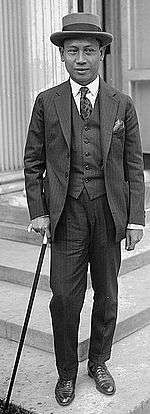Pedro Guevara
Pedro Guevara (February 23, 1879 – January 19, 1938), was a Philippine soldier, lawyer, legislator, and Spanish writer who became Resident Commissioner of the Philippines during the American colonial period.
Pedro Guevara | |
|---|---|
 | |
| Senator of the Philippines from the Fourth Senatorial District | |
| In office 1916–1923 | |
| Preceded by | Post created |
| Succeeded by | Ramon J. Fernandez |
| Resident Commissioner to the U.S. House of Representatives from the Philippine Islands | |
| In office March 4, 1923 – February 14, 1936 | |
| Preceded by | Jaime C. De Veyra |
| Succeeded by | Quintin Paredes |
| Member of the Philippine National Assembly from Laguna's Second District | |
| In office 1909–1916 | |
| Preceded by | Crispin Oben |
| Succeeded by | Crisanto Guysayko |
| Personal details | |
| Born | February 23, 1879 Santa Cruz, Laguna, Captaincy General of the Philippines |
| Died | January 19, 1938 (aged 58) Manila, Commonwealth of the Philippines |
| Political party | Nacionalista |
Early life
Born in Santa Cruz, Laguna, Philippines, on February 23, 1879.
Education
He attended the Pedro Guevara Memorial National High School and graduated from Colegio de San Juan de Letran, Manila, in 1896.
Philippine Revolution
He joined the Filipino forces during the Philippine Revolution and assisted in promoting the peace agreement of Biak na Bato at San Miguel, Bulacan, in 1897. He later rejoined the Filipino forces during the revolution, and also served throughout the Spanish–American War and the Philippine–American War, attaining the rank of lieutenant colonel.
Political career
Later, he became a journalist for the Spanish language newspaper Soberania Nacional and Vidas Filipinas and a municipal councilor of San Felipe Neri, Rizal in 1907. He studied law at La Jurisprudencia and became a lawyer in private practice. His political life started when he became a member of the Philippine House of Representatives from 1909 to 1912 and a member of the Philippine Senate from 1916 to 1922. In 1921, Guevara was chair of the Philippine delegation to the Far Eastern Bar Conference at Beijing, China. He later was elected as a Nationalist Resident Commissioner to the House of Representatives of the Sixty-eighth United States Congress for a three-year term and four succeeding three-year terms (March 4, 1923 – February 14, 1936). During this time, Guevara worked tirelessly for the approval of the Tydings–McDuffie Act which would establish the Commonwealth of the Philippines and eventually its independence in 10 years. Later, he served as delegate of Laguna during the Constitutional Convention of 1934 which framed the 1935 Philippine Constitution. His term ended on February 14, 1936, when a successor qualified in accordance with the newly established Commonwealth of the Philippines was selected.
Death
Upon retirement, Pedro Guevara resumed his law practice. He died of a heart attack in Manila on January 19, 1938, and was buried at the Manila North Cemetery.
See also
External links
| Wikimedia Commons has media related to Pedro Guevara. |
- United States Congress. "Pedro Guevara (id: G000518)". Biographical Directory of the United States Congress.
| U.S. House of Representatives | ||
|---|---|---|
| Preceded by Jaime C. de Veyra |
Resident Commissioner from the Philippines to the United States Congress 1923–1936 Served alongside: Isauro Gabaldon, Camilo Osías and Francisco A. Delgado |
Succeeded by Quintin Paredes |